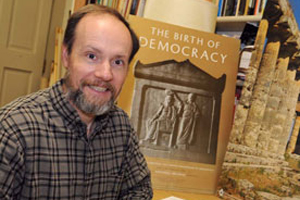What you should know: Classical Studies

 Classical Studies embraces the languages and cultures of ancient Greece and Rome.
Classical Studies embraces the languages and cultures of ancient Greece and Rome.
Temporally, that means that Classicists explore the Greek and Roman world
beginning with the Bronze Age and the Trojan War (ca. 1200 BCE) through the last Roman emperor, Romulus Augustulus, in 476 CE. Geographically, the Greek and Roman world extends from India in the east (conquered by Alexander the Great in 325 BCE) to Britain in the west (subdued by Caesar in 54 BCE), and from Germany to Africa north of the Sahara Desert.
 Latin and Greek are anything but dead.
Latin and Greek are anything but dead.
There is a continuous evolution of the Greek language from the Linear B tablets found during the Bronze Age through the Koine Greek (language of the people) spoken during the time of Jesus down to the modern Greek spoken today. Latin, which flourished as a first language for more than 1200 years and then another 1200 years as a second language for many people, is alive in Romance languages still spoken today: French, Italian, Portuguese, Romanian, and Spanish. Latin and Greek, moreover, are very much alive in the English language, which has more than 60 percent of its vocabulary from Latin and another 10 percent from Greek.
 Some of the greatest stories ever told and some of the greatest characters that ever walked the earth had their birth in the ancient Greek and Roman world.
Some of the greatest stories ever told and some of the greatest characters that ever walked the earth had their birth in the ancient Greek and Roman world.
Achilles chasing Hector around the walls of Troy, Clytemnestra murdering her husband upon his return from Troy, Antigone burying her brother against the orders of her uncle King Creon, Narcissus falling in love with his reflection, Pygmalion trying to fashion the perfect woman. And that is not to mention the stories from history: Miltiades stopping the Persians at Marathon, the tyrannicides assassinating Caesar, Antony’s affair with Cleopatra, Nero playing the fiddle as Rome burns. You get the idea!
 The ancient Greek and Roman world offers a useful lens through which to examine challenging social and moral issues.
The ancient Greek and Roman world offers a useful lens through which to examine challenging social and moral issues.
When challenged with seemingly intractable problems today, thinking about it in the ancient world helps provide some perspective. Gender, homosexuality, ethnic and racial issues, slavery, the individual and the state, science and religion, war and peace, and the relation of human and divine are all issues that pose a dilemma for us today. Approaching these issues in a culture separated from us by time and place helps us see important similarities and differences between our attitudes and theirs. For example, looking at Greek patterns of sexuality helps us realize that other cultures conceived of the concept of same-sex love and marriage in very different ways from our own. Exploring Greek and Roman comedies offers us a lens for understanding everything from Charlie Chaplin to Family Guy.
 Everybody wants a piece of the Greek and Roman world.
Everybody wants a piece of the Greek and Roman world.
That’s why travelers on the European Grand Tour (not to mention 30 Cornell students last March) made sure to visit Italy and bring back mementos of their visit. That’s why people still flock to shows like Gladiator, Troy, 300, and HBO’s Rome. That’s why the founders of our country created a democratic republic based on the models of Athens and Rome. That’s why Cornell students fill two sections of Latin or one section of Greek every year. So the next time you see a house decorated with columns, or the dome on the Capitol, or even a statue of Cupid in a garden, remember that it’s because we all want a piece of what’s classic.



